Fruit Puree Market Research, 2035
The global fruit puree market size was valued at $4.8 billion in 2023, and is projected to reach $10.1 billion by 2035, growing at a CAGR of 6.5% from 2024 to 2035. The market is expected to grow over the next few years due to a shift in customer preference toward packaged convenience foods on a global scale. Furthermore, the demand for fruit puree is anticipated to rise in the approaching years due to the expansion in the use of fruit puree in a variety of food processing industries, including bakery, drinks, smoothies, confectionary, baby meals, dairy, and frozen products. Fruit puree has gained popularity as a healthy alternative to sweets and artificial ingredients throughout the food processing industry as a result of the food and beverage industry's rapid expansion, which is due in part to favorable trade regulations and a growing global population.
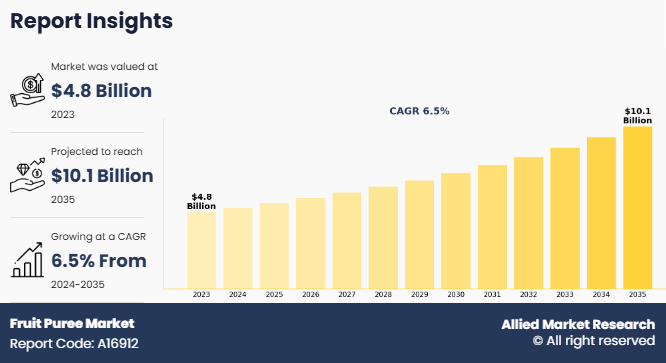
MARKET OVERVIEW
The market is expanding as a result of rising consumer demand for foods with longer shelf lives as well as seasonal products year-round. It can be used as a base for bakery fillings in tarts, Danish pastries, sweet pies, and many other bakery food products. Cheesecakes and mousses are both frequently made with fruit puree. It can be used to develop a specific flavor in jams and syrups, and it can be blended with drinks and juices to make a special combination. Fruit puree market demand is increasing globally as a result of manufacturers using fruit puree as a multifunctional component to give advantages including flavor extension and nutritional qualities.
In addition, the global market for fruit puree is also expanding as a result of the rise in consumption of a healthy diet and increased consumer knowledge of the benefits of eating well. Another crucial market driver is people's increased propensity for packaged food. Fruit puree's nutritional advantages are also anticipated to boost market expansion. People can be protected from a variety of cardiac problems by consuming fruit puree that is high in nutrients. The demand for fruit puree will rise even more due to the inclusion of important ingredients such as vitamin C, dietary fibers, carotenoids, and flavonoids during the forecast period.
Moreover, the global inclination of consumers for sweet foods and beverages, such as juices, nectars, smoothies, alcoholic beverages, drinkable dairy products, desserts, baked products, confectionary, and marmalades/jams, has fueled the market for fruit puree. Consumer choice is moving away from homemade cuisine and toward packaged convenience foods as a result of growing urbanization, hectic daily schedules, and increased per capita income. In addition, as consumers become more health conscious, their tastes are shifting from artificial drinks to fruit-related beverages, which is propelling the market expansion of the fruit puree sector. Customers generally feel that fruit puree has somewhat more calories than conventional fruit juices since it is more concentrated. Many vegans who refrain from consuming animal products do so to reduce calories, and they prefer fruit puree. Fruit purees also include antioxidants, which help to boost immunity and guard against cell damage in the body. Owing to the possibility that it may strengthen immunity, sales of fruit puree surged during the COVID-19 pandemic.
Furthermore, consumer products with a high rate of sale at a low price are referred to as fast-moving goods. Due to strong consumer demand or the fact that they are perishable, FMCGs have a limited shelf life. These products are widely purchased, quickly consumed, inexpensively priced, and widely distributed. Additionally, when they are on the store shelf, they rotate quickly. The adoption of experience retailing and consumer demand to supplement their physical shopping with a social or leisure activity have both contributed to the FMCG market's brisk expansion over the past few years. Many people have started adhering to special diets as a result of the general public's growing health consciousness, and they wish to enjoy these healthier options both at home and while dining out.
On the other hand, depending on their individual needs, many consumers in developing nations choose to buy fresh fruits from the market instead of fruit purees due to the high cost. People are very sensitive to the high price of goods since they can buy alternatives or the same thing in their natural state for less money, which serves as a barrier to the expansion of the fruit puree market.
A UNCTAD report, released on 3 May, made projections that the share of online retail sales in total retail sales is expected to expand from 16% to 19% in 2020 as a result of the sharp increase in e-commerce combined with the movement limitations brought on by COVID-19. E-commerce sales grew dramatically during the pandemic and are still increasing. Transporting goods from one location to another safely is quite difficult when selling anything online. If fruit shipments are to travel a long distance, there are several circumstances in which logistics can move forward about the product's packaging and temperature requirements. Fruit puree, however, can be prepared with little to no effort and is safe, convenient, and easy to do.
SEGMENTAL OVERVIEW
The fruit puree market is segmented on the basis of product, nature, application, and region. By product, the market is divided into tropical & exotic fruits, citrus fruits, berries, and others. By nature, the market is bifurcated into organic and conventional. By application, it is classified into cosmetics & personal care products, food & beverage, and others. The food & beverage segment is further categorized into bakery & dairy, confectionary, beverages, convenience foods, and baby foods. Region wise, the market is analyzed across North America, Europe, Asia-Pacific, and LAMEA.
BY PRODUCT
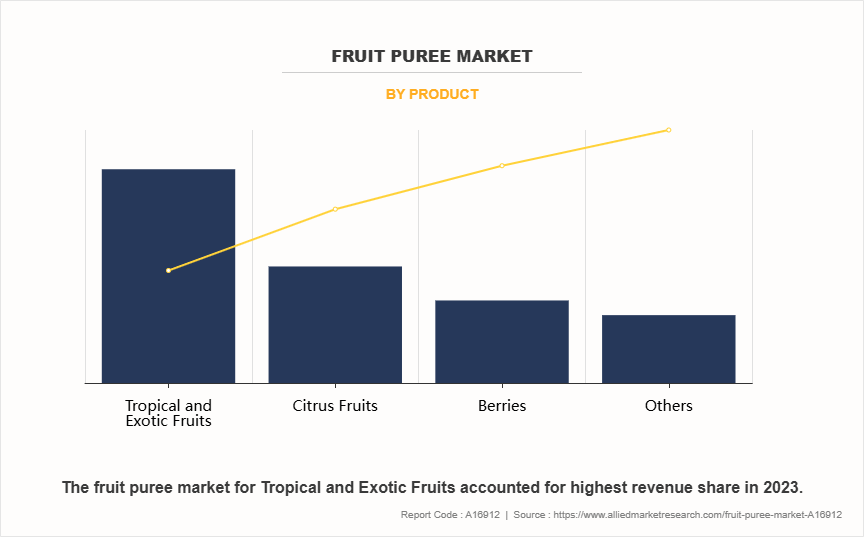
The tropical and exotic fruits segment, as per product, dominated the global fruit puree market in 2023 and is anticipated to maintain its dominance throughout the forecast period. The growing desire for natural, nutrient-dense ingredients in beverages, baby food, and confections is driving the growth of the tropical and exotic fruit puree industry. Mango, passion fruit, guava, and dragon fruit are popular types. Growing consumer demand for organic and clean-label products propels market expansion in all geographical regions.
BY NATURE
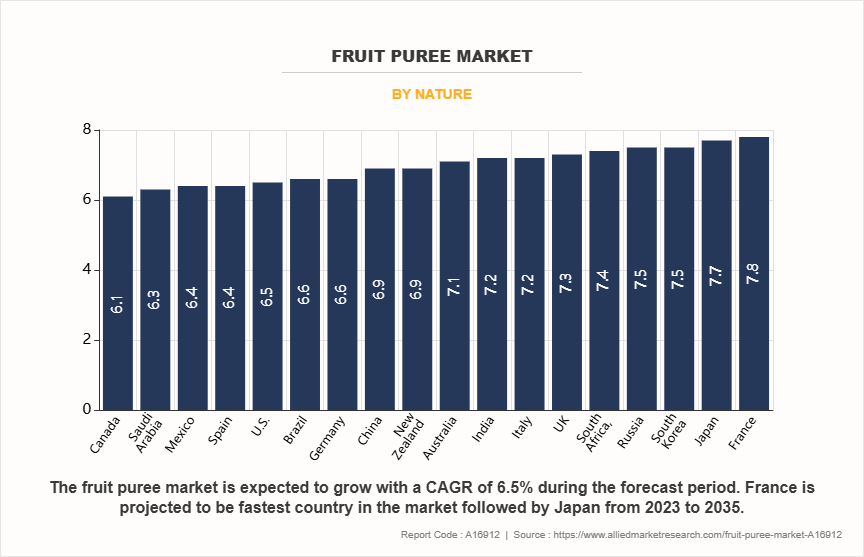
The conventional segment dominates the global fruit puree market. Conventionally grown fruit uses chemical fertilizers and pesticides that are helpful in fighting diseases and preventing pest infestations in the trees, thus ensuring proper fruit puree market growth and yield from the trees. Conventional fruit purees are preferred by consumers for mass production in confections, beverages, and baby food. Key firms concentrate on economical sourcing and processing methods to satisfy the growing demand in the food and beverage sectors.
BY APPLICATION
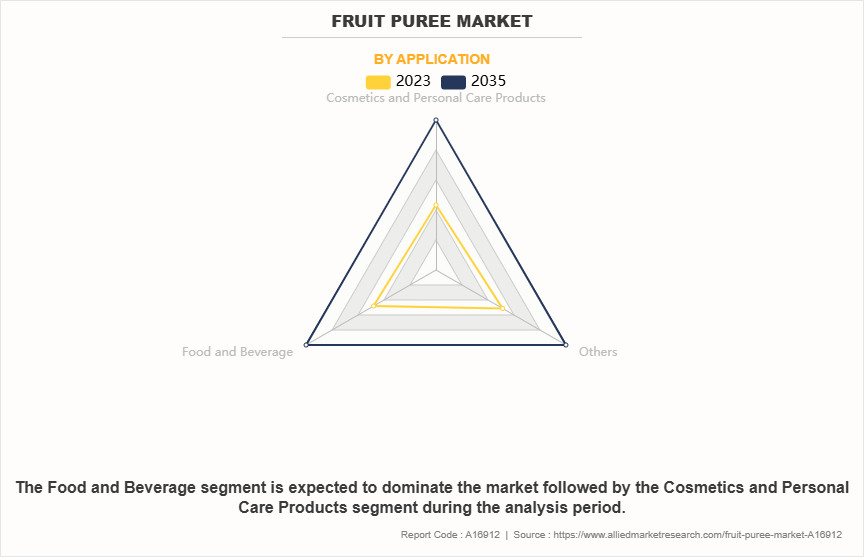
The cosmetics and personal care products segment exhibits the fastest growth in the global fruit puree market. Fruit puree's inherent exfoliating, moisturizing, and antioxidant qualities have led to its growing use in cosmetics and personal care products. The demand for organic and clean beauty formulations is supported by the inclusion of nutritious ingredients such as berry, papaya, and mango purees in skincare, haircare, and bath products.
BY REGION
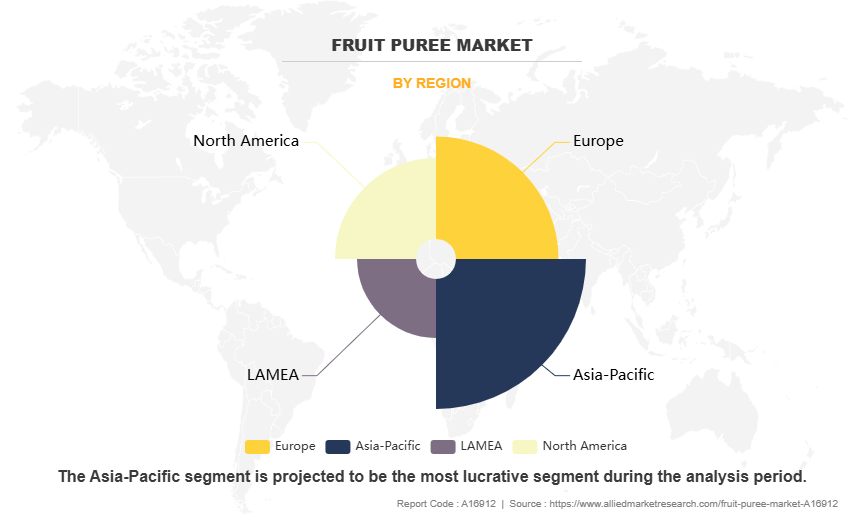
Region wise, Asia-Pacific dominated the market with the largest fruit puree market share during the fruit puree market forecast period. Increased use of natural ingredients such as fruit purees in processed meals is one of the key drivers of industry expansion. Fruit purees are a distinctive technique to include fruit flavors into processed foods to enhance their visual appeal and nutritional value.
COMPETITION LANDSCAPE
Companies that can comprehend consumer preferences, produce, and sell functional fruit puree products that meet those expectations have a new product opportunity with fruit puree augmented with functional ingredients. A few of the functional ingredients that the juice business can use to develop new products include omega-3 fatty acids, fiber, bioactive substances, vitamins, and probiotic bacteria. To enhance the nutritional profile of fruit puree, vitamins are added. In fruit puree, vitamins like vitamin D, vitamin E, vitamin A, and vitamin C are frequently present. Numerous government initiatives are under way all over the world, particularly in developing countries like China and India to promote the use of fortified foods and drinks. The fruit puree market has grown due to the surge in demand for functional beverages.
The major players analyzed for the fruit puree industry are Agrana Beteiligungs AG, Aseptic Fruit Puree, China Kunyu Industrial, David Berryman Limited, Dennick Fruitsource, Doehler Group SE, Fruit Puree Miami, Grunewald International, Ingredion Incorporated, Milne Food Products, Sicoly, SVZ International B.V., Tree Top Inc., Uren Food Group, Les Vergers Boiron, Irca S.p.a., Ponthier, Martin Braun-Gruppe, La Fruitière, Agence Hachetag.co, Fruinov, Bel Group, Roger Descours, Monin Incorporated. Key players operating in the fruit puree market have adopted product launch, business expansion, and mergers & acquisitions as key strategies to expand their fruit puree market share, increase profitability, and remain competitive in the market.
SOME KEY DEVELOPMENTS IN THE MARKET
- In August 2024, Soccer Shots, the leading youth soccer program for children ages 2 to 8 in the U.S., announced its new partnership with Tree Top, Inc., a farmer-grown, farmer-owned cooperative and leading producer of high-quality fruit-based products, including apple juices and sauces. As part of the two-year agreement, Tree Top becomes the Official Apple Juice and Fruit Snack Partner of Soccer Shots.
- In November 2024, Tree Top, a farmer-grown, farmer-owned cooperative and leading producer of high-quality fruit-based products (including apple sauces and juices) announced the launch of its online retail store.
- In August 2023, Fruit Purees Miami announced the nationwide availability of its Ruby Red Prickly Pear Aseptic Fruit Puree, catering to craft beer brewers across the U.S. This high-quality puree, known for its vibrant color and distinct flavor, is 100% natural, non-GMO, and free from additives.
Key Benefits For Stakeholders
- This report provides a quantitative analysis of the fruit puree market size, segments, current trends, estimations, and dynamics of the fruit puree market analysis from 2023 to 2035 to identify the prevailing fruit puree market opportunities.
- The market research is offered along with information related to key drivers, restraints, and opportunities.
- Porter's five forces analysis highlights the potency of buyers and suppliers to enable stakeholders make profit-oriented business decisions and strengthen their supplier-buyer network.
- In-depth analysis of the fruit puree market segmentation assists to determine the prevailing market opportunities.
- Major countries in each region are mapped according to their revenue contribution to the global market.
- Market player positioning facilitates benchmarking and provides a clear understanding of the present position of the market players.
- The report includes the analysis of the regional as well as global fruit puree market trends, key players, market segments, application areas, and market growth strategies.
Fruit Puree Market Report Highlights
| Aspects | Details |
| Market Size By 2035 | USD 10.1 billion |
| Growth Rate | CAGR of 6.5% |
| Forecast period | 2023 - 2035 |
| Report Pages | 250 |
| By Nature |
|
| By Product |
|
| By Application |
|
| By Region |
|
| Key Market Players | David Berryman Limited, Ingredion Incorporated, Ponthier, ROGER DESCOURS, Sicoly, Agrana Beteiligungs AG, Aseptic Fruit Puree, MONIN INCORPORATED, MARTIN BRAUN-GRUPPE, Uren Food Group, FRUINOV, Grunewald International, Tree Top Inc., Dennick Fruitsource, China Kunyu Industrial, IRCA S.P.A, Fruit Puree Miami, Doehler Group SE, BEL GROUP, Les Vergers Boiron S.A.S., Sunimpex International Foods LLC, SVZ International B.V., LA FRUITIèRE, Milne Food Products |
Analyst Review
The perspectives of the leading CXOs in the fruit puree industry are presented in this section. Fruit puree usage has increased as a result of customers' desire shifting toward healthier eating practices. Instead of utilizing artificial flavoring, consumers choose food products that are made from natural and organic raw materials. The market for fruit puree is growing primarily as a result of this aspect.
The CXOs further added that fruit puree has a longer shelf life than the fruit in its original state, resulting in lower shipping and storage expenses for producers. When fruit puree is used to create a product, the end item is improved in terms of taste as well as color. Thus, it is commonly utilized in food items including yogurt, infant food, and drinks. The use of synthetic pesticides and sewage sludge during fruit cultivation, however, may be detected in the fruit puree. As a result, both fruit farmers and exporters must take the required steps to maintain fruit quality.
Consumers' tastes and preferences for natural and organic foods are changing. In addition, rise in disposable income among people in emerging nations and surge in demand for ready-to-eat food goods are two other important factors influencing the market's expansion. Increased consumer awareness of the advantages of fruit puree consumption, rising concern over health problems such as deficiencies, increased willingness to pay more for high-end goods, and rising interest in leading healthy lifestyles are some other significant factors that support the market's expansion.
The global fruit puree market was valued at $4.8 billion in 2023, and is projected to reach $10.1 billion by 2035, growing at a CAGR of 6.5% from 2024 to 2035.
The forecast period in the fruit puree market report is 2023 to 2035.
The base year calculated in the fruit puree market report is 2023.
The top companies analyzed for global fruit puree market report are Agrana Beteiligungs AG, Aseptic Fruit Puree, China Kunyu Industrial, David Berryman Limited, Dennick Fruitsource, Doehler Group SE, Fruit Puree Miami, Grunewald International, Ingredion Incorporated, Milne Food Products, Sicoly, SVZ International B.V., Tree Top Inc., Uren Food Group, Les Vergers Boiron, Irca S.p.a., Ponthier, Martin Braun-Gruppe, La Fruitière, Agence Hachetag.co, Fruinov, Bel Group, Roger Descours, Monin Incorporated.
The berries segment is the most influential segment in the fruit puree market report.
Asia-Pacific holds the maximum market share of the fruit puree market.
The company profile has been selected on the basis of key developments such as partnership, product launch, merger and acquisition.
The market value of the fruit puree market in 2023 was $4.8 billion.
Loading Table Of Content...
Loading Research Methodology...


